
2579
.pdfThis does not sound a very attractive place to live, and in fact, considering how huge the country is, very few people do live there. Most of these people are reindeer hunters and breeders, fur hunters and trappers, and cattle and horse breeders. There are several tribes of them, the biggest being people called the Yakuts. These are sturdy people with dark hair and slanting eyes who look more like Mongols than Russians. They speak a language rather like Turkish.
There are about 250 000 Yakuts, spread over thousands of square kilometres – that is, fewer people than live in a single town such as Coventry or Leicester in England. There is only one to any size – Yakutsk, on the river Lena, and that has no railway to it, though there is now an airport.
Although the land of the Yakuts has so long and cold winter, it has a quite hot summer, lasting only 3 or 4 months, and then the sun goes below the horizon only for a few hours each day, and it is light through most of the night. But the hot summers are so short that in the north the ground never thaws more than a few centimetres down. So it is not easy for the Yakuts to grow crops. But, by experimenting, scientists have now discovered some seeds, which are tough enough to live through the winter and grow fast enough to ripen during the short summer.
There is one advantage in living in a very cold climate: the cold kills the germs, which give people diseases. So people do not often get ill, and many people in Yakutia live to be 100 years old or more. In old days people often died in the winter for lack of food, for it was difficult to store enough to carry them through 8 or 9 months of winter. Now to keep the cows and horses alive through the winter is still a problem. Meat, fish, and vegetables are frozen and salted, and in the winter people buy their milk in round frozen slabs instead of in bottles. In the summer the Yakuts bring their furs and animals to the great markets at Yakutsk and exchange them for stores for the winter. During the summer they can travel by river, but during the winter it is not easy to move about at all.
Today conditions in Yakutia are changing very much, as they are over most of Siberia. There is a great deal of coal and tin and iron in the country, and rich diamond and gold mines. The only difficulty is that there are no railways in Yakutia and only very bad roads, and the rivers can be used only in the summer. But as railways are built, mining towns will grow up, and there will be work and more wealth for everyone.
7.How many parts can you divide this text on? Entitle them.
8.Complete the following sentences:
1.Rivers of this area … for more than half a year.
2.… the only notable town of this region.
3.Few people living here … .
40
4.The main food of these people includes … .
5.The main ways of communication are … .
6.Yakuts are … .
7.Yakutia is rich in … .
9.What kind of person can be called sturdy? Explain the meaning.
10.Can you explain the difference between exploration and conquest?
11.Find the sentences with "there is/ there are" in the text. Translate them. Try to transform singular to plural or plural to singular if possible.
For example: There is no tower in the old square.→ There are no any towers in the old square. There are many kinds of minerals in Russia. → There is a great deal of minerals in Russia.
Can you transform them without using "there is/ there are"?
For example: There is a wide door in the room. →The room has (got) a wide door.
12.Do you agree that climate in Yakutia is severe and range of temperature is great? Prove it. Does it have any advantages and why?
13.Do you know how the exploration and conquest of Siberia began? What name is usually associated with this event?
14.Speak about a) traditional way of life in Yakutia, b) way of life in our century. Use the information from the text and the following facts:
1.Yakuts are skilled bone carvers. They also make beautiful bas-relief portraits.
2.Wheat is grown in Yakutia despite the short summer. The institute of Agricultural Research, opened in 1956, is helping agronomists and farmers to enlarge the wheat area and to move this valuable grain crop northward.
3.Yakutia uses the latest machinery to develop its great wealth of minerals. It has Russia's largest deposits of diamonds, tin, mica and phlogolite. There are rich veins of gold.
4.One fifth of the fur produced in Russia comes from Yakutia.
5.Reindeer has always been a vital part of life in this region. People use their skins for clothes, yurtas, for manufacture of the finest chamois and their meat for food.
41
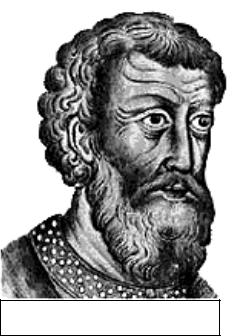
15. Read the dialogue and speak on the Yakuts character. Say what reputation have the Russian in your opinion:
-Every nation has a reputation of some kind. For example, everybody believes that the French are light-minded and the Germans are punctual.
-What kind of people are the English?
-They say that unlike the Americans, the English are cold, reserved and conservative.
-That isn’t always true.
-Of course not. But we are talking about the reputation they have.
Text 2
16. Read the text and think what made a family of merchants Stroganov so important in the conquest of Siberia:
THE CONQUEST OF SIBERIA
I
As the Princes of Moscow grew stronger, they often fought with the city of Novgorod, and in the end they conquered it. In the 15th century there was a family of Novgorod merchants called Stroganov, who decided that it would be much wiser to make friends with the powerful Princes of Moscow. So when the Tartars captured a prince of Moscow called Vasily the Dark, and demanded a very high ransom for him, Luka Stroganov paid all the ransom money that the Tartars demanded, and asked for nothing in return. When Vasily the Dark returned to Moscow, he was so grateful to the Stroganovs that he granted them a free hand in trade in northern Russia (that means that no one else might trade there). Soon the Stroganov
family grew as wealthy as the Prince himself.
The Stroganovs had heard tales that the lands of Siberia far away to the north-east, beyond the Ural Mountains, were very rich, not only in furs, but also in iron, copper, and even gold. So Anika Stroganov got permission from the Tsar Ivan the Terrible to conquer the wandering tribes in Siberia and bring back
42
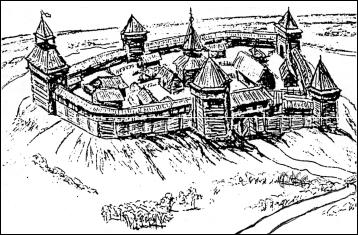
all the riches he could find. In return, he had to send some furs and gold to the Tsar in Moscow. Anika knew that he could never conquer Siberia without soldiers, for the Tartars considered that Siberia belonged to them. So Anika asked the Tsar for soldiers, and called on Yermak, a Cossack, to lead an army to fight the Tartar princes of Siberia. Yermak had only a few soldiers, but they were brave and well trained and they knew how to use firearms, which the Tartars in Siberia had never seen. Yermak conquered the Tartar capital in Siberia, and made the Tartars pay him tribute in furs. He built little fortresses wherever he could in Siberia and left a garrison in them to rule the country he had conquered. The Tartars had built few towns, but some of Yermak’s fortresses were the beginnings of the great cities of Siberia today. Among the first Siberian towns there were:
Tyumen – 1586,
Tobolsk – 1587,
Surgut – 1593,
Tara – 1594,
Obdorsk (now it is Salekhard)
– 1595, Tomsk – 1604,
Krasnoyarsk – 1628,
Ust-Ishim – 1631,
Irkutsk – 1661.
17.Answer the following questions:
1.Whose idea was it to explore Siberia?
2.Is there any reason why the merchants of all social groups were interested in exploring the new land?
3.Why was Siberia so attractive for Stroganov?
4.Why did the Tsar permit Stroganov to conquer Siberia?
5.Who was the main enemy of Russians in Siberia?
6.Why did Tartars build very few towns?
7.Who led the soldiers to Siberia?
8.Do you know anything about his life?
18.Give equivalents in English for the following word-combinations:
семья купцов, намного мудрее, ничего не попросил взамен, такие богатые как и, возглавить армию, получил позволение, заставил татар платить дань, великие города
43
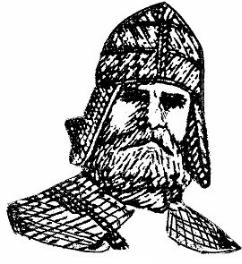
19. Put these events into chronological order:
the beginning of the reign of Ivan the Terrible the Tartar-Mongolian yoke
the conquest of Novgorod Yermak's expedition
strengthening of Moscow princedom
Which of them do you consider to be important for the conquest of Siberia and why?
20. Show the difference in meaning of the following words, compose a sentence with each for illustration:
demand – ask belong – possess wander – go fortress – town payment – ransom
21.Make sentences from these words:
1.Prince, wealthy, Stroganov, grew, the, as, family, the, himself, as.
2.the, Vasily, captured, called, of Moscow, Tartars, a prince, the Dark.
3.knew, without, that, never, Anika, conquer, he, Siberia, could, soldiers.
4.Yermak, capital, in, the Tartar, Siberia, conquered.
5.Tartars, towns, had, the, few, built.
22.Find the most interesting facts from this text. Try to retell them in English to your friend. Why did you choose these facts?
ЕРМАК (Ермолай) Тимофеевич, кличка Токмак (между 1537 г. и 1540 г., село Борок на Северной Двине — 05 августа 1585 г., берег Иртыша близ устья Вагая), русский землепроходец, завоеватель Западной Сибири, казачий атаман (не позже 1571 г.).
44
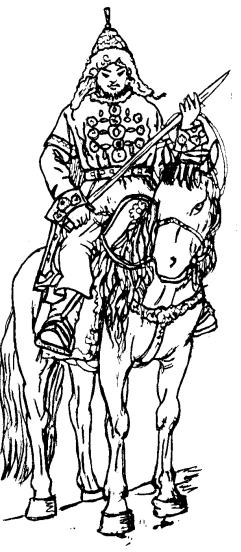
«РОДОМ НЕИЗВЕСТНЫЙ...»
Фамилия Ермака не установлена, однако в те времена, да и гораздо позже многие русские именовались по отцу или по кличке. Его величали либо Ермаком Тимофеевым, либо Ермолаем Тимофеевичем Токмаком. Голод в родных краях вынудил его, крестьянского сына, человека недюжинной физической силы, бежать на Волгу, чтобы наняться к старому казаку в «чуры» (разнорабочий в мирное время и оруженосец в походах). Вскоре в бою он добыл себе оружие и примерно с 1562 г. начал «полевать» — постигать ратное дело. Отважный и разумный, он участвовал во многих боях, изъездив южную степь между низовьями Днепра и Яика, побывал, вероятно, на Дону и Тереке, сражался под Москвой (1571 г.) с Девлет-Гиреем. Благодаря своей смелости, справедливости и таланту организатора стал атаманом. В Ливонской войне 1581 г. командовал флотилией волжских казаков, действовавшей по Днепру у Орши и Могилева; возможно, участвовал в операциях под Псковом (1581 г.) и Новгородом (1582 г.).
«СИБИРСКОЕ ВЗЯТИЕ»
По велению Ивана Грозного дружина Ермака прибыла в Чердынь (близ устья Колвы) и Соль-Камскую (на Каме) для укрепления восточной границы купцов Строгановых. Вероятно, летом 1582 г. они заключили с атаманом соглашение о походе на «сибирского султана» Кучума, снабдив припасами и оружием. Возглавив отряд из 600 человек, Ермак 1 сентября начал поход в глубь Сибири, поднялся по реке Чусовой и ее притоку Межевая Утка, перешел на Актай (бассейн Тобола). Ермак спешил: лишь внезапное нападение гарантировало успех. Ермаковцы спустились в район нынешнего города Туринска, где рассеяли передовой отряд хана. Главное сражение разыгралось 26 октября на Иртыше, на мысе Подчуваш: Ермак разбил татар Маметкула, племянника Кучума, вступил
вКашлык, столицу Сибирского ханства,
в17 км от Тобольска, и нашел там много ценных товаров и пушнины. Через
45
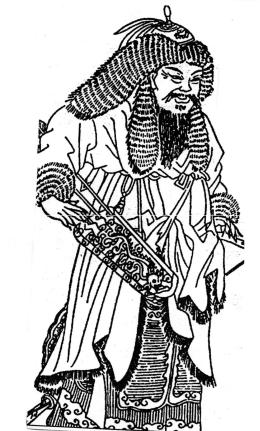
четыре дня явились ханты со съестными припасами и мехами, за ними — местные татары с дарами. Ермак встречал всех «лаской и приветом» и, обложив податью (ясаком), обещал защиту от врагов. В начале декабря воины Маметкула убили группу казаков, рыбачивших на озере Абалак, близ Кашлыка. Ермак настиг татар и уничтожил почти всех, но Маметкул спасся.
ПОХОД НА ОБЬ И ПОСОЛЬСТВО В МОСКВУ
Для сбора ясыка на нижнем Иртыше в марте 1583 г. Ермак отрядил партию конных казаков. Они встретили небольшое сопротивление. После ледохода на стругах казаки спустились по Иртышу, под видом ясака захватывая в приречных селениях ценные вещи. По Оби казаки дошли до холмистого Белогорья, где река, огибая Сибирские Увалы, круто поворачивает на север. Здесь они нашли только покинутые жилища, и 29 мая отряд повернул обратно. Для получения помощи Ермак направил в Москву 25 казаков. Посольство прибыло в столицу в конце лета. Царь наградил всех участников Сибирского похода, простил государственных преступников, примкнувших к Ермаку ранее, и обещал послать еще 300 стрельцов.
ГИБЕЛЬ ЕРМАКА
Смерть Ивана Грозного нарушила многие планы, и стрельцы-казаки добрались до Ермака лишь осенью в разгар восстания, поднятого карачи (высшим советником Кучума). Небольшие группы казаков, рассеянные по огромной территории, были перебиты, а основные силы Ермака вместе с подкреплением из Москвы 12 марта 1585 г. были блокированы в Кашлыке. Подвоз продовольствия прекратился, и среди русских начался голод; многие погибли. В конце июня в ночной вылазке казаки перебили почти всех татар и захватили обоз с продовольствием; осада была снята, но у Ермака осталось около 300 бойцов. Через несколько недель он получил ложное известие об идущем в Кашлык торговом караване. Ермак поверил и в июле с 108 казаками выступил к устью Вагая, разбив там та-
46
тар. Но о караване ничего не узнал. Вторую победу Ермак одержал близ устья Ишима. Вскоре он вновь получил сообщение о торговом караване и вновь поспешил к устью Вагая. Дождливой ночью коварный Кучум неожиданно напал на стан казаков и перебил около 20 человек, погиб и Ермак. 90 казаков спаслись в стругах. Смерть атамана Ермака, который был душой всех походов, сломила дух казаков и они, покинув Кашлык 15 августа, вернулись на Русь.
О Ермаке еще в 16 в. были сложены предания и песни, позднее его образ вдохновлял многих писателей и художников. В честь Ермака назван ряд населенных пунктов, речка, два ледокола. В 1904 г. в Новочеркасске ему поставлен памятник (скульптор В. А. Беклемишев, архитектор М. О. Микешин); его фигура выделяется на монументе 1000-летия России в Новгороде.
(Хроника человечества, В. И. Магидович, «Большая энциклопедия Кирилла и Мефодия», электронный вариант).
23.Choose any part of the text you like and translate it into English.
24.Questions for discussion:
1.What advantages did Yermak's army have?
2.Did Tartars have any advantages? Compare them.
25.What do you know about further history of Siberia?
26.To get more information read the second part of the text. Try to formulate what was the influence of social policy of the government on exploration and population of Siberia:
THE CONQUEST OF SIBERIA
II
At that time the ordinary people of Russia led hard lives. As time went on they became serfs, little better than slaves, and were often treated cruelly by their masters. Many young and strong men made up their minds to run away from their miserable homes and try to make their fortunes in Siberia, where there were no serfs. Also many criminals and others who had got into trouble in Russia escaped to Siberia to make a new life there. They knew that if they could send furs and gold to the Tsar, he would quickly forgive them their crime. More and more adventurous people sought their fortunes in Siberia. Then, about 100 years after Yermak’s first expedition, another Cossack managed to cross the
47
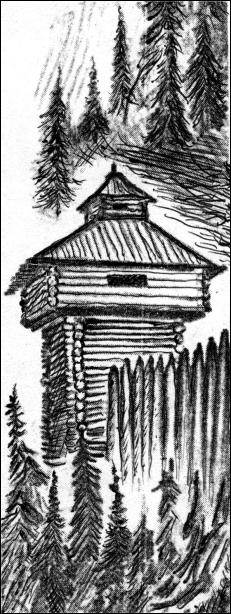
whole of Asia and reach the Pacific Ocean, over 9000 kilometres from Moscow. This was in a time when there were no roads, and long before the Trans-Siberian railway was built, and it took him several years to make the crossing.
There are many stories of the adventures of these early pioneers in Siberia, of their struggles against the bitter cold, and their constant battles with wild tribes, in particular with the Yakuts who live near the great river Lena and hunt reindeer and breed horses and cattle. Life was very hard and violent. The Tsars sent officials to Siberia to keep order and to collect taxes, but they had to pay them twice as much as the officials in Russia itself. In spite of the hardships and dangers, however, many people made their fortunes in Siberia.
Later, the Russian Government began sending prisoners to Siberian prisons, where they were made to work in the mines in very hard conditions. Some of these prisoners who were sent to Siberia were not ordinary criminals, but were in trouble for political or religious reasons, and were clever and welleducated men. Those who completed their prison sentences often stayed in Siberia to make their fortunes. They helped to build up the country, as many English convicts helped to build up Australia.
So, during the 16th and 17th centuries, all the enormous lands of Siberia, from the Ural Mountains to the sea north of China, became a part of Russia. Rus, the princedom of Rurik and his family, had become the largest country in the world, and today the Siberians are the toughest and strongest of the Russians.
27.Make a plan of this text.
28.Put the verbs in brackets into the correct forms:
1.Masters … (often/treat) their serfs cruelly.
2.Many young men … (run) away to Siberia.
48
3.People … (send) fur and gold to the Tzar.
4.The early pioneers … (struggle) against cold, hunger and wild tribes.
5.Officials … (send) to Siberia to collect taxes.
6.Some of those people, who … (work) in the mines, … (commit) a crime, others … (get) there because of their religious or political views.
7.So Siberia … (build) up by adventurous people and prisoners.
8.Siberia … (conquer) and … (become) a part of Russia.
29.Give equivalents in Russian for the following sentences:
1.Many people made up their minds to escape to Siberia.
2.One Cossack managed to reach the Pacific Ocean though it took him several years to cross Asia.
3.The first settlers struggled against severe climate conditions and neighbouring tribes.
4.Prisoners were made to work in the mines.
5.People had to pay the officials twice as much as the officials in Russia itself.
30.What facts do these figures refer to?
9000, 16 – 17, 100.
31. Give equivalents in English for the following word-combinations:
простые люди, решили сбежать, испытать удачу, кто попал в беду, борьба с жестокими морозами, охотиться на оленей, собирать налоги, работать на рудниках, по политическим и религиозным причинам
32. Find pairs of synonyms:
to decide, to escape, to get into trouble, to get rich, to have problems, to make one's fortune, to make up one's mind, to run away
33. Find the forms of infinitive in the text "The conquest of Siberia" (Part II). Translate them into Russian (use the table). Try to formulate the same ideas in other words.
For example: I came here to talk to you. → I came here because I want to talk to you. The purpose of my coming here is that I want to talk to you.
49
